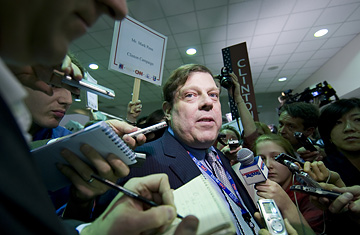
Clinton campaign advisor Mark Penn speaks to reporters following the Democratic debate at the University of Texas at Austin, February 21, 2008.
(2 of 3)
But neither of them held quite the central position that Penn has in the Clinton operation. That is largely because of the personal trust he enjoys from the Clintons themselves. Penn was little known outside of New York when he was brought in to help out on Bill Clinton's reelection campaign in 1996, and was credited with devising the strategy that helped get the President through impeachment. Rather than engaging in a public fight over the charges themselves, Penn advised, Clinton should focus on compiling a record of accomplishment — even modest ones that he had touted in his reelection campaign, like advocating school uniforms and providing cell phones for neighborhood watch groups. That way, even if the public was put off by his private behavior, it would be reminded of how much it liked the job he was doing as President.
Today, Penn's official biography on the Burson-Marsteller website touts the fact that there is a note on his office wall from Clinton saying "thanks" for helping him get through impeachment, along with one from former British Prime Minister Tony Blair declaring "you were brilliant" in helping him win his historic third election to the post. Alongside them are photos of Penn working with business luminaries Bill Gates and Bill Ford Jr.
When Hillary Clinton hired Penn for her 2000 Senate campaign — after Penn was ousted from the Gore presidential operation after clashing with the vice president and his team over strategy — he advised her to put her effort into making inroads into the hostile Republican territory in upstate New York. Today, she points to her success as proof she can draw voters outside the traditional Democratic base. (Penn, Schoen & Berland, which Penn had co-founded in 1975 as a Harvard undergrad, generated a reported $31.4 milion in revenue the year Clinton was first elected, and was bought in 2001 by London-based WPP Group Plc, the world's second-biggest advertising company and owner of Burson-Marsteller.) But in this campaign Penn, who has never worked in such a high-profile position in a Democratic presidential primary, has been widely blamed for insisting that Clinton emphasize her experience in a political climate where voters seem to be thirsting for change.
There are other aspects of Penn's way of doing business that have rankled officials in the Clinton campaign. Unlike most campaign pollsters, he does not delve deeply into the numbers he has gathered when he makes his presentations and recommendations. "He never shows you the crosstabs," says one Democratic strategist who is familiar with Penn's work. "He does a PowerPoint, and he never shows you the data that underlies the conclusions he is presenting." A source who knows the workings of the Clinton campaign says that, after much wrangling over that issue, Penn started turning over his data to the top echelon of officials there — but that it usually came in weeks after a decision had already been made and executed on the basis of his advice.
